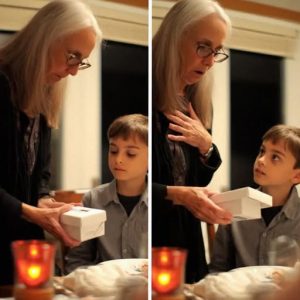I didn’t take the stage that night to settle scores or demand recognition. I stood up because the moment demanded honesty — and honesty meant that he needed to be seen fully, exactly as he is. I spoke about him not as the public might know, but as the world should understand: a young man molded by kindness, decades of steady effort, and countless quiet influences that laid the groundwork for his success.
In my remarks, I honored the small gestures that carried him forward — without ever shifting the spotlight to myself. I spoke simply and truthfully. The audience came in expecting conflict, tension, maybe a dramatic revelation. What they got instead was gratitude — a calm reflection that softened the atmosphere and surprised even those who believed they already understood his story.
After the speech, he found me. He was clearly moved: tears formed in his eyes, he struggled to speak through relief and apology. In his voice, I heard real recognition — not just for what I had done, but for the years we had shared. He saw, finally, the meaning behind my actions: the unasked rides, the late-night study sessions, the meals I left waiting when he was overwhelmed, and the quiet guidance I offered when he needed it most — all without expectation of anything in return.
These are the things no one applauds on a stage or praises in speeches. They happen in the margins, in the silent spaces where love actually works. It dawned on me then: I never needed public acknowledgment. What mattered was that he saw the truth — not because I demanded recognition, but because he was ready. The applause that followed wasn’t for me. It was for the deeper idea that love can be patient, that it doesn’t vanish when it goes unseen, and that it doesn’t need validation to remain real.
Later, when the room emptied and the lights went down, I felt no triumph or vindication. Just a quiet peace. Love had done what it was built to do. It had supported him until he could walk on his own. It had stepped back so he’d have room to grow. It remained constant, yet humble — never asking to be named. True care doesn’t demand grand gestures; it whispers between the lines, shaping someone’s story over time.
That night wasn’t about reclaiming credit. It was about revealing a deeper truth. In recognizing him fully, he grew — not just in his public success, but in his maturity and self-understanding. He came to know that success is never solitary; it is built from shared effort, unseen sacrifices, and devotion without strings. That truth, I believe, will remain with him far longer than any speech ever could.





